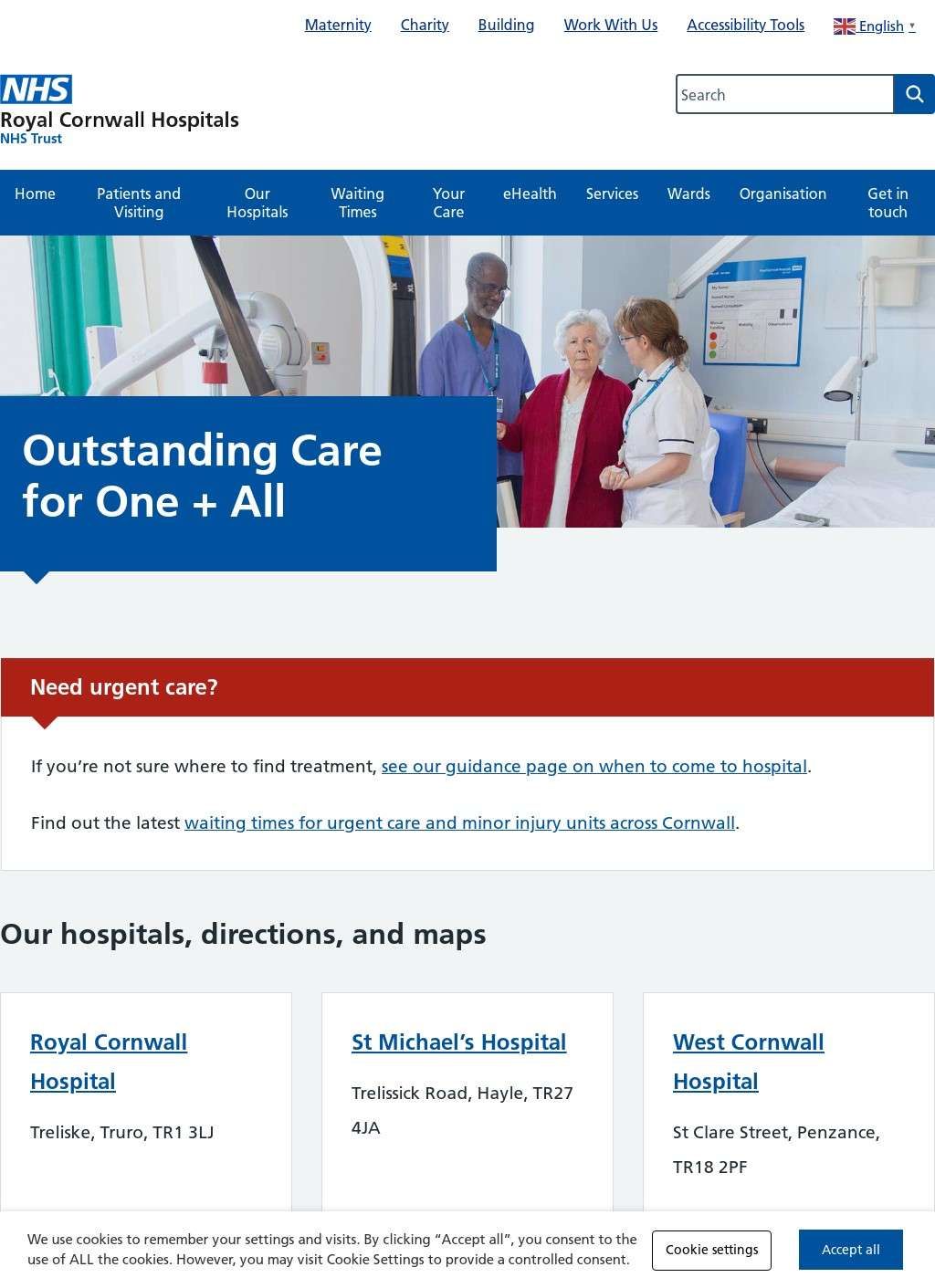Royal Cornwall Hospitals NHS Trust serves as the medical backbone for England's southwestern peninsula, providing acute healthcare services to nearly half a million residents across Cornwall and the Isles of Scilly. Operating from three main sites – the flagship Royal Cornwall Hospital at Treliske near Truro, St Michael's Hospital in Hayle, and West Cornwall Hospital in Penzance – this NHS trust manages the complex task of delivering modern healthcare across a largely rural county with unique geographical and demographic challenges.
The trust's history stretches back to 1992 when it emerged as part of the second wave of NHS trusts established in England. However, the story of organized healthcare in Cornwall runs much deeper, with the current Royal Cornwall Hospital at Treliske opening in 1968 to replace aging Victorian facilities. Today's trust represents decades of evolution in medical service delivery, adapting continuously to serve a population that swells dramatically during tourist seasons and ages more rapidly than the national average.
Royal Cornwall Hospital at Treliske functions as the county's primary emergency and specialist care center. This 750-bed facility houses the main emergency department, handling everything from farming accidents to summer's surfing injuries. Specialist services include Cornwall's only dedicated stroke unit, a comprehensive cancer center providing chemotherapy and radiotherapy, and the peninsula's neonatal intensive care unit. The hospital also serves as a teaching facility for the University of Exeter Medical School, training the next generation of doctors in an environment where they'll encounter an unusually diverse range of medical challenges.
The trust's workforce of approximately 6,700 staff represents one of Cornwall's largest employers, supplemented by 400 volunteers and a flexible bank staff of 1,500. These numbers tell only part of the story – recruiting and retaining skilled medical professionals in Britain's furthest corner presents perpetual challenges. The trust has developed innovative approaches to staffing, including partnerships with metropolitan hospitals for specialist rotations and comprehensive training programs that emphasize the unique rewards of practicing medicine in Cornwall.
Geographic isolation significantly shapes service delivery. Air ambulances regularly ferry critically ill patients to and from the mainland, while the trust must maintain a broader range of specialties than similarly sized hospitals elsewhere. The nearest alternative major hospitals lie in Plymouth or Exeter, both hours away by road. This isolation has driven innovation, with the trust pioneering telemedicine services and remote consultation systems that connect Cornish patients with specialists across the country without requiring arduous journeys.
Financial pressures mirror those facing the broader NHS but carry additional complexity. The trust's 2023-24 annual income of £666.6 million must stretch to cover higher costs associated with Cornwall's geography and demographics. Seasonal population fluctuations mean maintaining year-round capacity for summer demand peaks, while an aging population drives ever-increasing demand for complex medical interventions. The recent announcement of £100 million funding for a new women's and children's hospital represents a significant investment in Cornwall's healthcare future.
Recent years have brought both challenges and innovations. The COVID-19 pandemic tested the trust's resilience, requiring rapid service reconfigurations and new ways of working. Environmental initiatives have seen the trust pioneer mask recycling technology, potentially the first NHS trust to sustainably process the thousands of surgical masks used daily. The formation of provider collaboratives with Cornwall Partnership NHS Foundation Trust and acute hospitals across Devon represents strategic thinking about healthcare sustainability across the southwest peninsula.
The trust's digital infrastructure continues to evolve, with electronic patient records and digital imaging systems improving care coordination. The website serves as a crucial communication channel, providing everything from visiting information to detailed service directories. Online appointment systems and virtual consultations have become increasingly important, particularly for patients in remote areas who might otherwise face lengthy journeys for routine follow-ups.
Quality improvement initiatives permeate the trust's operations. Recent focuses include reducing emergency department waiting times, improving stroke care pathways, and enhancing maternity services. The trust emerged from special measures in 2019 after addressing concerns about long waiting times and service pressures, demonstrating resilience and commitment to improvement. Current performance metrics show continued progress, though challenges remain in meeting national targets while serving Cornwall's unique population.
Community engagement plays a vital role in the trust's governance and service development. Public board meetings, patient participation groups, and regular consultations ensure Cornish voices shape healthcare delivery. The trust's charity arm raises funds for equipment and facilities beyond standard NHS provision, reflecting strong community support for local healthcare services. Social media channels and regular newsletters maintain dialogue with the population served.
Integration with other health services continues to deepen. The establishment of community frailty services at Bodmin Hospital exemplifies efforts to provide care closer to home, reducing pressure on acute sites while improving patient experience. Joint working with Cornwall Council on initiatives like purchasing care home beds demonstrates system-wide thinking about managing Cornwall's healthcare challenges. These partnerships become increasingly crucial as the health and social care landscape evolves.
Looking ahead, Royal Cornwall Hospitals NHS Trust faces both opportunities and uncertainties. Plans for the new women's and children's hospital promise transformed maternity and pediatric services. Continued medical school partnerships should help address workforce challenges while positioning Cornwall as an attractive training location. Climate change poses new challenges, from preparing for extreme weather events to reducing the trust's environmental footprint. The ongoing integration of health services across Cornwall and collaboration with Devon providers suggests a future where administrative boundaries matter less than delivering excellent patient care. For Cornwall's residents and its many visitors, the trust remains an essential institution, providing not just medical treatment but peace of mind that comprehensive healthcare exists even in Britain's beautiful but remote southwestern corner.
